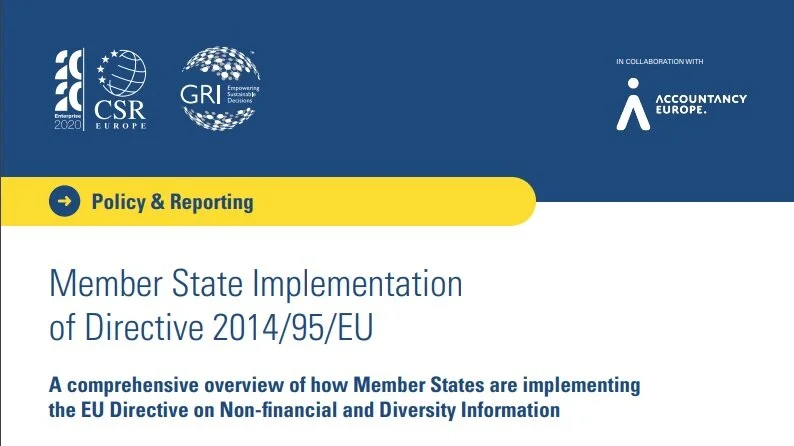Our Network’s Feedback on the EU Non-Financial Reporting Directive
CSR Europe continues to shape the EU policy dialogue on the revision of the Non-Financial Reporting Directive (NFRD).
we welcome the appointment of board member maria alexiou as member of the efrag Reporting Lab’s Project Task Force on Non-Financial Risks and Opportunities and Linkage to the Business Model.
CSR Europe submitted in June the network’s collective response to the public consultation on the revision of the Non-Financial Reporting Directive (NFRD).* The review of the NFRD is part of the Commission’s strategy to strengthen the foundations for sustainable investment at a time when stakeholders are demanding more and better information from companies about their social and environmental performance and impact.
Here are the key elements that our network believes should be taken into account by the Commission in the revision process of the NFRD:
Reporting to integrate sustainability and attract sustainable investment
Reporting should be considered as a means towards integrated sustainability performance and management across business strategy, functions and value chains. At the same time, a more transparent reporting practice should secure a level playing field for companies: the enhanced transparency should translate into more sustainable investments that support companies in their transition and sustainable business transformation.
Flexibility and materiality above all
The revision and related additional measures of the NFRD should NOT result in a tick box exercise but keep a strong “Comply or Explain” approach. They should also provide the absolute flexibility for companies to identify with their internal and external stakeholders which topics are most material for them to report on.
Smart mixed approach to better coupling compliance AND capacity building
The revision should be coupled with accompanying capacity building measures to support efficient and effective reporting from the companies falling under the scope of the directive and the many more thousands, including Small and medium-sized enterprises (SMEs) that are directly impacted by it. Many reports (e.g. from Econsense & UNGC Germany, Alliance for Corporate Transparency, the EC Fitness Checks, the Review of the French Law on” Devoir de Vigilance” and the Final Report by EFRAG European Lab) clearly demonstrate that there is a need to go beyond compliance and guidance, and to equip enterprises and their sector associations, investors and authorities with the right capacity building instruments (e.g. to adapt internal processes; to undertake smart stakeholder dialogues and materiality assessment; to support client /suppliers to provide the necessary information). If this is not done, the risk is twofold:
Europe will reach poor impact, low geopolitical leadership and not much of system change
Further gaps will be interpreted for even more regulation and standards, ending in a Tick Box exercise; exactly what the EU Institutions managed to avoid both in the spirit and in the text of the NFRD, choosing for a clear “Comply or Explain” approach.
Strong policy coherence needed
We expect strong policy coherence between the potential revision of the NFRD with other forthcoming legislations and initiatives, such as the EU Taxonomy, the Due Diligence Law, and the announced initiative on Sustainable Corporate Governance.
Since 1997, CSR Europe has been working with companies on ESG reporting and with the Commission’s Directorate-General (DG) for Internal Market, Industry, Entrepreneurship and SMEs (GROW) to co-create the NFRD.
In the framework of Non-Financial Reporting, CSR Europe is also happy to announce that Maria Alexiou, Member of the CSR Europe Board and CSR Director of Titan Cement Group, joined the new Project Task Force on Non-Financial Risks and Opportunities and Linkage to the Business Model, which is part of EFRAG Reporting Lab, as representative of our organisation.
After the publication of the Report “How to improve climate-related reporting”, this year CSR Europe will work with EFRAG to identify good practices on how to connect effectively material information of a business model to related non-financial risks and opportunities.
Therefore, with the Project Task Force, we will look at:
how risks and opportunities of the operating environment impact companies;
how company business model may have environmental and social impact;
how to mitigate these risks.
* Disclaimer:
The final draft submitted to the European Commission is the result of compiling and aligning feedback, ambitions and expectations from a diverse membership of companies from different sectors, geographies, corporate culture as well as different approaches and experiences in relation to the potential revision of the EU Directive on Non-Financial Reporting. The Draft also reflects the long-standing experience and the sensitivities of many of our National Partner Organisations (NPOs) which are supporting enterprises with Non-Financial Disclosure as a means towards better integrated decision making and performance. Please also note that CSR Europe’s response does not engage the opinion of any of our individual members. Therefore, our response does not cite or refer to any member.






